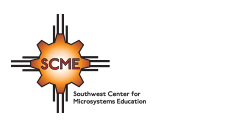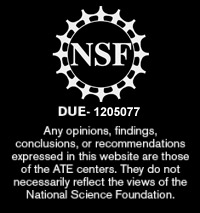SCME
Southwest Center for Microsystems Education
Albuquerque, NM
www.scme-nm.org
Contact
Matthias Pleil
Principal Investigator (PI)
mpleil@unm.edu
(505) 272-7157

SCME Adds Microsystems Concepts to STEM Instruction
Biannual surveys of SCME professional development recipients show that SCME hands-on kits and other educational materials are impacting high school, community college, and university students. These surveys found that students have used SCME materials for more than 310,000 hours since 2012.
Approximately 300 community college and four-year college students completed a certificate or associate degree in a technology program that included microsystems educational components. Half of these students continued their education, while the other half found employment. Approximately 10% were early leavers, individuals who left before completing their degree because they found a job.
Micro-Pressure Sensors Make Useful Vehicles for Applied Learning
To prepare students for microsystems industry needs, SCME’s educational materials and professional development activities focus on micro-pressure sensors. The center has developed more than 50 learning modules that include dozens of hands-on activities that teach about micro-pressure sensor design, fabrication, and applications.
SCME’s micro-pressure sensor workshops and supporting curriculum have been successfully transferred to five other educational institutions. By offering these multi-day workshops in clean rooms in various locations, SCME makes advanced micromanufacturing education more available to students, educators, and employers. These workshops cover chemical safety, surface and bulk micromachining processes, sensor operation, electronics, microdevice characterization, crystallography, and microelectromechanical systems (MEMS) applications.
SCME provides its entire curriculum including presentations, animations, instructor and student guides, hands-on classroom activities, and a dozen related, hands-on kits so that professional development participants can take their clean room experience into regular classrooms. More than 100 educators have participated in the clean room workshops; another 400 participants have attended 40 other workshops during the current grant.




